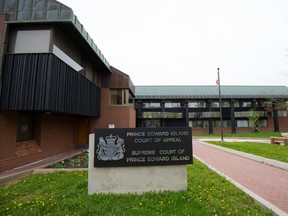'The Charter is there for all Canadians': P.E.I. court quashes breathalyzer conviction
Lawyers for a Ukrainian woman involved in a single vehicle accident argued authorities failed to make sure she understood what she was being told

Article content
Prince Edward Island is no longer ethnically homogenous and its institutions need to keep up, the province’s highest court has ruled in the case of an immigrant who tried to end her life after getting caught up in a justice system she couldn’t understand.
Vira Polusmiak, a 50-year-old Ukrainian immigrant living in Charlottetown, was charged with refusing to take a breathalyzer test after a single vehicle accident on June 6, 2019, near her home. It took her three years and three court rulings to get the conviction quashed, after her lawyers argued authorities failed to make sure she understood what she was being told.
“During the 20th century, Prince Edward Island was almost exclusively white, Anglo-Saxon, Acadian, Catholic, Protestant with a small Indigenous population. It was a rare and exotic occurrence indeed to hear a language other than English or French spoken,” the small province’s Court of Appeals ruled in a decision this month.
“Times have changed.”
Polusmiak did not provide breath samples to police after the crash due to her minimal understanding of English, even after an officer tried to demonstrate what she needed to do. An ambulance attendant testified there was a clear language barrier: “(Polusmiak) was unable to give information required for our paperwork such as her address, phone number and next of kin.”
The officers arrested her and read out her right to counsel, but she only vaguely responded. “I’m not sure exactly what her response was but she indicated that she would speak with her husband the following day and attempt to make contact with counsel at that time,” said one of the officers at court. She later testified that she did not understand the meaning of the word “lawyer.”
“On any fair reading of the evidence there can be no doubt that Polusmiak was struggling to understand. The police knew or ought to have known that fact,” said the appeal court.
She was held at the Provincial Correctional Centre for eight hours, without any contact with family. Not aware of where she was, Polusmiak assumed she was being held at a police station.
Distraught, she later consumed pills in a suicide attempt the day after being released.
At her trial, Polusmiak argued with the aid of a translator that she did not understand English well and did not comprehend her right to counsel on the night of the arrest. But the court found her guilty, and an initial appeal was denied.
Now, the province’s highest court has quashed the conviction, citing Polusmiak’s lack of understanding of the language, and noted her suicide attempt demonstrated the mental pressure the incident had on her.
A police officer does not discharge his obligations under the Charter by repeating himself in a language which the detainee does not understand
Justices John Mitchell, Michele Murphy, and David Jenkins
“The Charter is there for all Canadians,” ruled Justices John Mitchell, Michele Murphy, and David Jenkins. ”A police officer does not discharge his obligations under the Charter by repeating himself in a language which the detainee does not understand.”
Polusmiak speaks Ukrainian and Russian but her English was limited when she immigrated to Canada in 2017.
Todd MacEwen, information services coordinator at the Immigrant and Refugee Services Association of Prince Edward Island, said the Island has a growing immigrant population and linguistic barriers are a primary focus of his agency.
“There are situations where you’ll have a 10- or 12-year-old basically be the interpreter for the family and it’s kind of hard; that’s a lot of responsibility to put on a small child to be the sole means of communication back and forth,” added MacEwen.
Polusmiak is employed as a housekeeper at the Delta Hotel in Charlottetown, where her boss, Cathy DesRoches, said other Russian-speaking employees could train her. DesRoches said she has a staff of 35 with 18 different nationalities.
Better language training facilities should be made available at both work and school for inclusivity of the population, said MacEwen.
Our website is the place for the latest breaking news, exclusive scoops, longreads and provocative commentary. Please bookmark nationalpost.com and sign up for our newsletters here.








Postmedia is committed to maintaining a lively but civil forum for discussion. Please keep comments relevant and respectful. Comments may take up to an hour to appear on the site. You will receive an email if there is a reply to your comment, an update to a thread you follow or if a user you follow comments. Visit our Community Guidelines for more information.